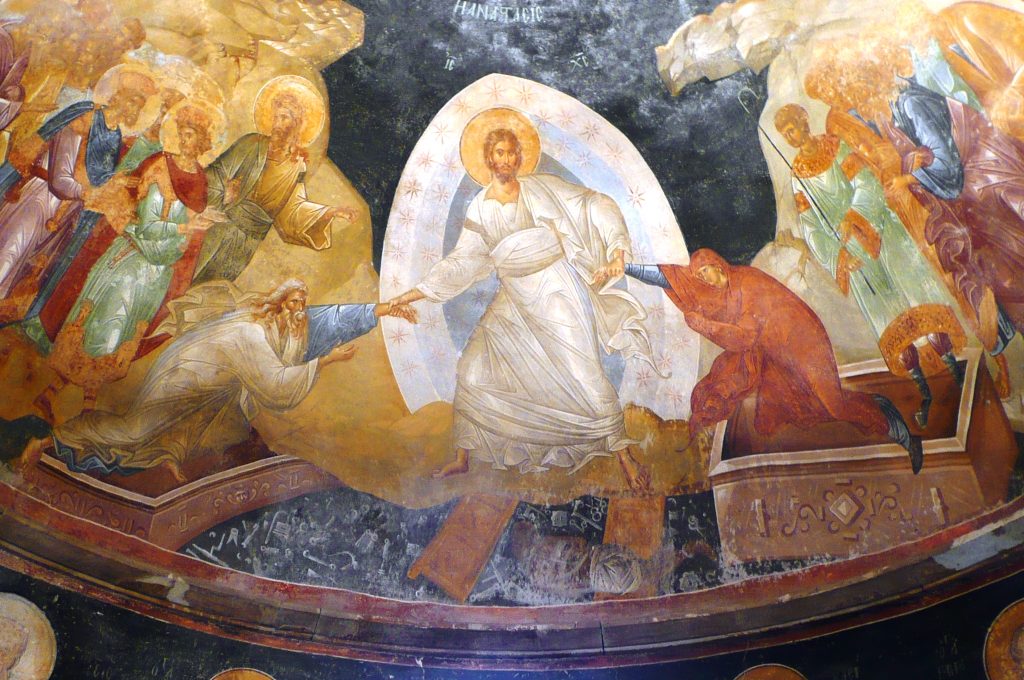
It is easy to insist that we are not saved by a religion but by a spirituality. However, such a view, when expressed in social media, usually means only that a person wishes to be free to develop their own religion. It is those who have abandoned all connection to the Apostolic Christian Tradition who usually insist on the importance of a personal and private spirituality. Of course the issue is that a Christian spirituality without any religious structure and coherence is not Christian at all, but is a vague and indulgent expression of self-righteousness. Just as a practice of Christian religion without an authentic spirituality is not a true manifestation of Christianity either, but equally an attempt to save ourselves by our own activities.
True Christianity, that experience of abundant life in Christ, is found by a genuine participation in the Apostolic and Orthodox spiritual way, as formed in faithful Orthodox Christians by the Apostolic and Orthodox structure of teaching and practice. The two have to be united in our experience so that we are neither following simply a set of rules in a mechanistic manner, nor doing whatever we choose ourselves, and calling it life. If Christianity is life, abundant life, then it is a life given as a gift by God himself, and therefore our participation in this life must be in accordance with the love and truth of God himself, who is our life, and not simply in accordance with our own preferences, however much we dress them up as being spiritual.
The purpose of the Christian way, the meaning of the Incarnation, is that the image of God might be renewed in mankind by the coming in the flesh of the Word of God, whose image we are created to bear. It is that death be destroyed in the resurrection of God who is life himself, and that man receive again that union with God which is the gift of the indwelling Holy Spirit. As St John writes, we abide in God and he in us, because he has given us of his Spirit.
The true Christian Spirituality is one in which we experience this union with God by the Holy Spirit. St Athanasius is not afraid to describe this union with God by the Holy Spirit as a being made divine, saying, those in whom the Spirit is are made divine, and if he makes men divine then it is not to be doubted that the Spirit is God. We should not go beyond what is Orthodox. This being made divine is not to become God according to essence, since man, a created being, will always remain man. But it is to share in the life of God as far as is possible for created being, by the union with God in the indwelling Holy Spirit. This life of God, given as the gift of grace in the Holy Spirit, is light and love and the fullness of what it means to be truly human in the image of God.
But this divine life is not given on our own terms, as if we could just adopt a personal spirituality. It is given by God in accordance with the divine truth revealed in the teaching of the Apostolic and Orthodox Church, and in accordance with the divine love experienced in the practice of the same Apostolic and Orthodox Church. We are baptised, not for the sake of performing a religious ritual, but to receive in the sacrament, and as a reality, the beginning of a new life in union with Christ. We are chrismated, not for the sake of performing a religious ritual, but to receive truly in the sacrament the indwelling Holy Spirit. We participate in the eucharist, not for the sake of performing a religious ritual, but to receive a renewal and strengthening of our union with Christ, and the life of the Holy Spirit, as nourishment and spiritual power for body and soul.
And in the rule of prayer, making the words of the Agpeya our own through sustained effort in grace, we find ourselves standing in the presence of God. While the habitual practice of the Jesus Prayer, developing in the faithful soul an experience of unceasing prayer, is a participation in the life and love of God when it is true prayer. Even our obedience to the rule of fasting and our daily reading and reflection on the Scriptures are not ever simply religious activities. They are necessary to those following the Apostolic way of spiritual life because they are the means by which we sustain and increase our experience of the Holy Spirit, in a manner that is not always visible to us.
The true and abundant life which Christ gives to those who follow him, demands obedience and commitment to the Apostolic and Orthodox spiritual tradition. It is not given independently of the Apostolic and Orthodox tradition of teaching and practice. Nor can it be demanded even by those who seek to follow this tradition. It is always the gift of grace by the indwelling Holy Spirit, who unites us with God and by whom God is glorified in his saints. The union with God begins in this life by the indwelling Holy Spirit, as a conscious and fruitful experience of God’s loving and sustaining presence in the heart, and will continue through the separation of body and soul, and in the resurrection and for eternity. But it is to begin now, because to know Christ is already abundant life, transforming life, a transfiguring light and an unfailing love. It is the source of holiness, peace and joy in the Holy Spirit and a fountain of life and love poured out from the heart to those around.

One Response to "Union with God"